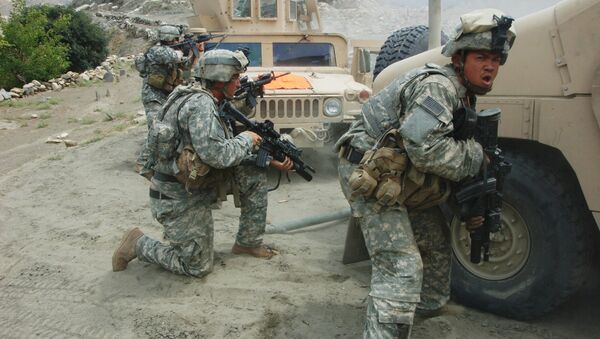WASHINGTON (Sputnik) — US military leaders are worried about the situation in Afghanistan, which continues to deteriorate more than 15 years after the Taliban regime was overthrown. NATO Resolute Support Mission Commander Gen. John Nicholson said in a briefing in September he was concerned about the high rate of casualties suffered by US-trained Afghan security forces.
Moreover, the US inspector general for reconstruction said in a report earlier this year that the Taliban control more territory inside Afghanistan than at any other point since 2001.
Despite worsening conditions, Afghanistan has been ignored on the presidential campaign trails and literally absent from actual debates in the United States.
"The debate featured not a single word — not one word — about Afghanistan, where US troops continue to die. It is truly the forgotten war," Wilson Center scholar Michael Kugelmen tweeted after a presidential debate in St. Louis on October 9.
With the November 8 election just days away, the world has little insight into how the next resident of the White House will handle the situation in Afghanistan, where violence is escalating, the Taliban is resurgent and the Islamic State has vowed to expand its footprint — while the government in Kabul remains in political gridlock.
"Neither of the candidates has an alternative to the present policy on Afghanistan and how to reverse the current trajectory," Middle East Institute scholar Marvin Weinbaum told Sputnik.
Hilary Clinton, Weinbaum suggested, would offer continuity with the Obama administration’s policy with possibly a more robust military role.
"Trump has likely not given a moment of thought to the subject," Weinbaum pointed out.
The candidates are ignoring Afghanistan, Weinbaum claimed, because the American electorate is not focused on the issue. And the media would focus on Afghanistan if the candidates did, he added.
"Unlike the ISIS [Daesh] in Iraq and Syria and the issue of who supported the Iraq war at the outset, Afghanistan has not been a partisan issue," Weinbaum added.
Brookings Institution Foreign Policy Program Research Director Michael O’Hanlon told Sputnik that Afghanistan has gotten to be the conflict wherein the United States is "muddling" along partly because, "there are no great options."
Clinton favors a sustained commitment, O’Hanlon explained, but does not claim that it is going to transform the region or Afghanistan itself.
The former secretary of state will aim to protect the large investment the United States has sunk into Afghanistan with a force that is only ten percent the size it used to be while suffering even a smaller percentage of casualties.
"As long as there is something to hold onto or some progress, some working semblance of a coalition government and a democratic process and an Afghan army and police that will fight for their country, it makes sense to sort of reinforce the efforts we have made so far and try to avoid having that country become a safe haven for extremists," O’Hanlon said, which is why Clinton’s strategy makes sense.
Clinton’s approach, O’Hanlon explained, could leave Afghanistan hopefully acting as sort of anchor for the US government in "the eastern flank in the war on terror."
Trump, on the other hand, may want to pull out of Afghanistan, O’Hanlon suggested, but has been reluctant to make that argument too intently to avoid diluting the pro-military message he is trying to underscore and for fear of being accused of "cutting and running" or "accepting defeat."
"I do think he [Trump] has made a fairly clear point of opposing the continuation of the mission," O’Hanlon stated.
"Going back to 2012, Romney versus Obama, I think it sort of reflected back then when no one talked about it either — the fact that we just didn’t see great options," O’Hanlon explained. "We also didn’t really think we would leave."
As secretary of state, Clinton supported Obama’s 2009 "surge" strategy to boost troop levels by some 33,000 in Afghanistan and backed the escalation of the CIA drone program.
Trump’s positon on Afghanistan specifically is not well-document, but he has been repeatedly criticized even by members of his own Republican Party for advocating an overall foreign policy perceived as isolationist.
In July, Trump told the New Yok Times earlier this year that the constant deployment of troops abroad is unnecessary given that the US military can deploy from American soil whenever needed. Trump has also publicly stated that he eschews the type of military adventurism that Clinton supported when she was the country’s chief diplomat.



